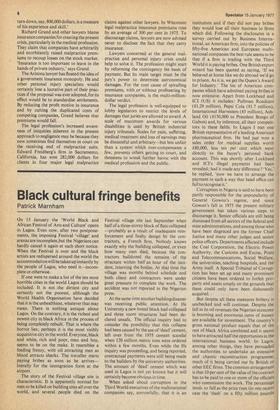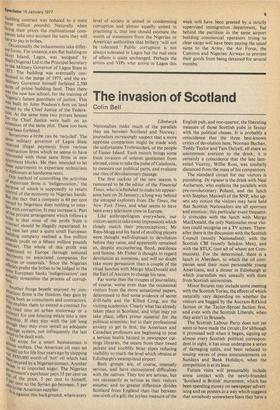Black cultural fringe benefits
Patrick Marnham
On 15 January the 'World Black and African Festival of Arts and Culture' opens in Lagos. Even now, after two postponements, the imposing Festival 'village' and arenas are incomplete,but the Nigerians can hardly cancel it again at such short notice. When the Festival is over and the black artists are redispersed around the world the accommodation will be taken up instantly by the people of Lagos, who need it—incomplete or otherwise.
If one were to make a list of the ten most horrible cities in the world Lagos should be included. It is not the dirtiest city and certainly not the poorest, although the World Health Organisation have decided that it is the unhealthiest, whatever that may mean. There is nothing antique about Lagos. On the contrary, it is the richest and newest city in black Africa in the process of being completely rebuilt. That is where the horror lies; perhaps it is the most visibly acquisitive city in the world. Everyone, black and white, rich and poor, man and boy, seems to be on the make. It resembles a feeding frenzy, with oil attracting men as blood attracts sharks. The traveller starts paying bribes as soon as he arrives— literally for the immigration form at the airport.
The story of the Festival village site is characteristic. It is apparently normal for men to be killed on building sites all over the world, and several people died on the Festival village site last September when half of a three-storey block of flats collapsed —probably as a result of inadequate reinforcement and faulty design by the contractors, a French firm. Nobody knows exactly why the building collapsed, or 'even how many men died, because the contractors bulldozed the remains of the structure within half an hour of the incident, interring the bodies. At that time the village was months behind schedule and both client and contractors were under great pressure to complete the work. The accident was not reported in the Nigerian press.
At the same time another buildingdisaster was receiving public attention. At Ife University a new hostel block had collapsed and three more structures had been declared unsafe. The official inquiry had to consider the possibility that this collapse had been caused by the use of 'dead' cement, left over from the 1975 cement scandal when 120 million metric tons were ordered within a few months. Even while the lfe inquiry was proceeding, and being reported, contractual payments were still being made to the builders by the university authorities. The amount of 'dead' cement which was used in Lagos is not yet known but it will certainly become obvious in time.
When asked about corruption in the Third World executives of the multinational companies say, sorrowfully, that it is an institution and if they did not pay bribes they would lose all their business to firms which did. Following the disclosures in a survey carried out by Business International, an American firm, into the policies of fifty-five American and European multinational companies the best rule seems to be that if a firm is trading with the Third World it is paying bribes. One British export wizard has been quoted as saying, 'If we behaved at home like we do abroad we'd go to prison. As it is, we get the Queen's Award for Industry.' The list of American companies which have admitted paying bribes is now extensive. Apart from Lockheed and [Cl (US) it includes: Pullman Roadcars ($1.29 million), Pepsi Cola ($1.7 million), International Harvesters (85 million), Ashland Oil ($150,000 to President Bongo of Gabon) and, by inference, all their competitors in these fields. In Lagos I met one British representative of a leading American pharmaceutical firm. He had just won a sales order for medical supplies worth £80,000, less ten per cent which went directly to the buyer's personal bank account. This was shortly after Lockheed and ICI's illegal payments had been revealed ; had it made any difference? 'Yes,' he replied, 'now we have to arrange the payment in such a way that head office can fail to recognise it.'
Corruption in Nigeria is said to have been partly responsible for the unpopularity of General Gowon's regime, and since Gowon's fall in 1975 the present military government has taken various steps to discourage it. Senior officials are still being dismissed from all sectors of the federal and state administrations, and among those who have been disgraced are the former Chief Justice and many other judges and senior police officers. Departments affected include the Coal Corporation, the Electric Power Authority, the Customs and Excise, Posts and Telecommunications, Social Welfare, the universities, teaching hospitals, and the Army itself. A Special Tribunal of Corruption has been set up and many prominent citizens have been ordered to forfeit property and assets simply on the grounds that these could only have been dishonestly acquired.
But despite all these measures bribery is unchecked and will continue. Despite the fall in its oil revenues the Nigerian economy is booming and enormous sums of money are available for investment. The country's gross national product equals that of the rest of black Africa combined and it seems to have attracted half the opportunists in the international business world. In Lagos, among other things, they have persuaded the authorities to undertake an extensive and chaotic reconstruction programme, much of it being carried out by British or other EEC firms. The common arrangement is that 10 per cent of the value of the contract has to be paid to one or more of the officials • who commission the work. The percentage tends to fall as the price rises (in one recent case the 'dash' on a fifty million pounds
building contract was reduced to a mere three million pounds). Naturally when nxing their prices the multinational companies take into account the sums they will have to pay in bribes. Occasionally the inducements take different forms. For instance,asix-flat building on ticoYi Island, Lagos, was 'assigned' by Shell (Nigeria) Ltd to the Principal Secretary to the Military Governor of Lagos State in 1973. The building was eventually connscated in the purge of 1975, and the exMilitary Governor himself forfeited 2,500 acres of prime building land. Then there was the new law school, for the training of Nigeria's future guardians of justice. This was built by John Poulson's firm on land Owned by the Chief Justice of the Federa1,.i°n. At the same time two private houses 'or the Chief Justice were built on an extension of the same plot. These too have since been forfeited.
Sometimes a bribe can be 'recycled'. The sanle military governor of Lagos State received illegal payments from various construction firms which he seems to have reinvested with those same firms in new iapartment blocks. He then intended to let "lese apartments to expatriate technicians °r diplomats at handsome rents.
ce'ne method of controlling the activities °' expatriate firms is 'indigenisation,' the rlurPose of which is supposedly to return litrol of the economy to Nigerian hands. 5BUt the fact that a company is 60 per cent ?wiled by Nigerians does nothing to inter'ere With corruption. It may increase it. Part °t)f,the private arrangement which follows a r'be is that most of the profit from a contract should be illegally repatriated. In !/Ite case last year a quite small European ouilding company realised a five million kinds profit on a fifteen million pounds c_ontract. The whole of this profit was "egatriated to Europe through notional DaYments to associated companies for se,,rvices or materials.' Since the Nigerian sc/Incials prefer the bribes to be lodged in the :elle European banks 'indigenisation' can tiotnu!ItY streamline the process of corrup st Another fringe benefit enjoyed by confirms is the freedom they gain by -rekt!ng both as consultants and contractors. 0'4 enables them to extend a contract for e„,rle road into an urban motorway or a to'ltract for one housing estate into a new enwnship. If they stay with the job long drcIagh they may even install an adequate ci.,'age system, not infrequently the last aI to be dealt with. 41The scope for a smart businessman is hilltost endless. One American oil man set 041°. self up for life four years ago by shipping bt:e S450,000 worth of 'hot' oil which had
secured by a Nigerian contact. Another
" is in imported sugar. The Nigerian vern— • •
inznt's purchaser pays 15 per cent on inznt's purchaser pays 15 per cent on
„." of the price, 5 per cent to himself, 47, r cent to the Syrian go-between, 5 per "It to the American supplier. t is against this background, where every
level of society is united in condemning corruption and almost equally united in practising it, that one should estimate the worth of statements from the Nigerian or American authorities that bribery 'will not be tolerated.' Public corruption is not always tolerated in Lagos but the real state of affairs is quite unchanged. Perhaps the artists and VIPs who arrive in Lagos this week will have been greeted by a strictly supervised immigration department, but behind the partition in the same airport building commercial operators trying to clear cargo will have been paying the usual sums to the Army, the Air Force, the Customs and Nigerian Airways to prevent their goods from being detained for several months.



































 Previous page
Previous page